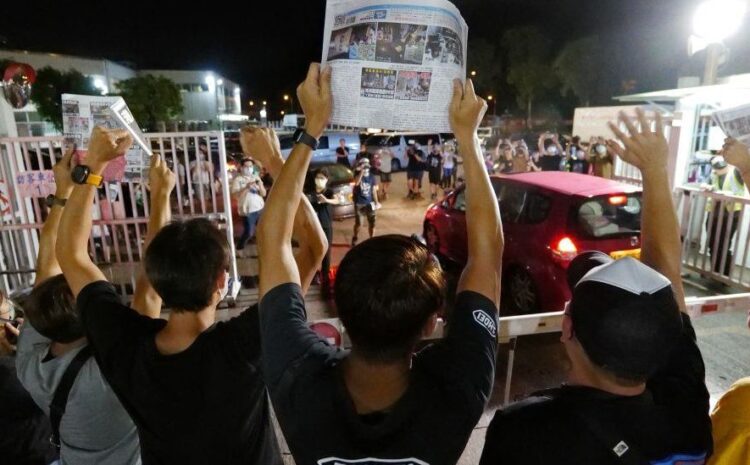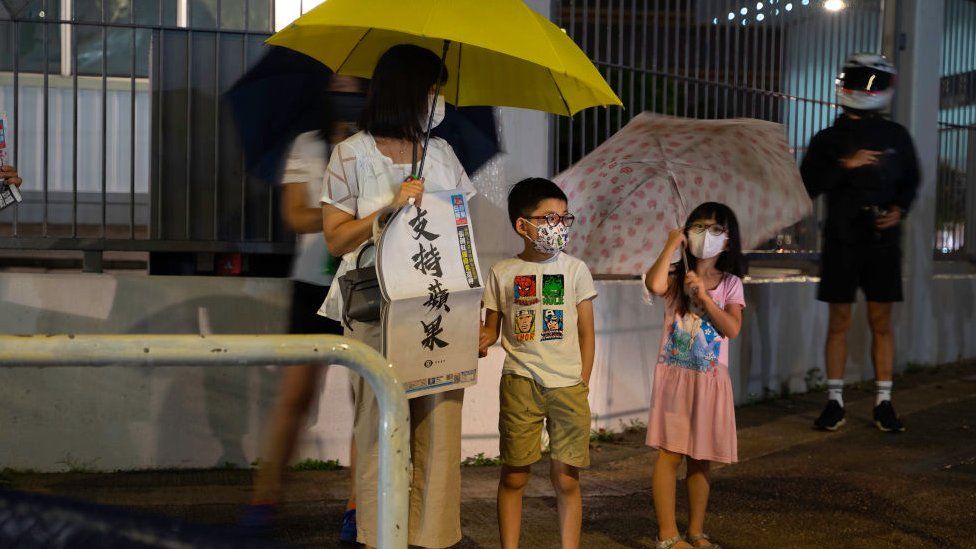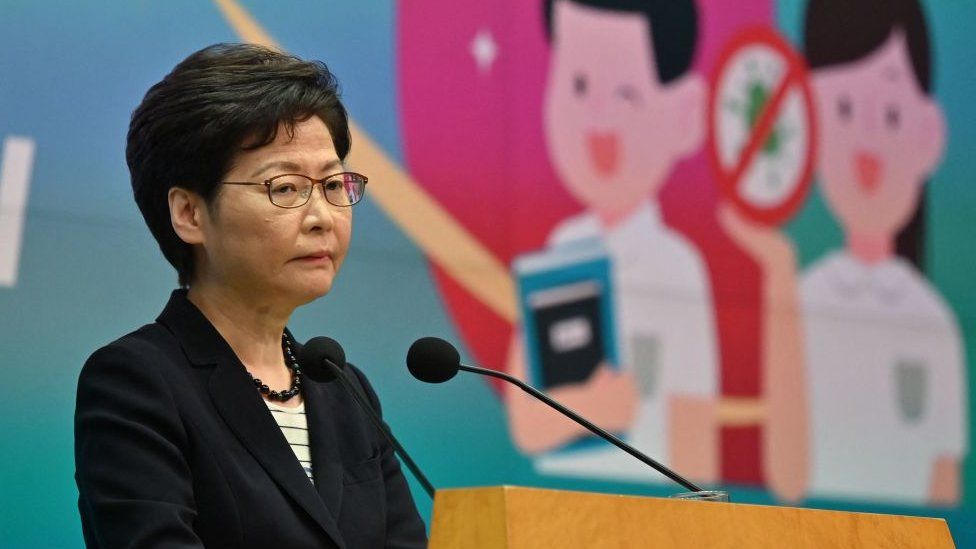
GETTY IMAGES image captionApple Daily saw a wave of support during its final days
On Sunday night, police announced that they had arrested a former senior journalist with the now-shut Apple Daily at the airport as he was trying to leave the city.
Apple Daily closed down after officials arrested its senior leadership under the city’s controversial national security law and froze its assets. Its owner, media mogul Jimmy Lai, was already in jail on a string of charges.
News of the arrest came hours after Stand News – popular with pro-democracy supporters – said it would shelve commentary pieces over fears of a crackdown.
Stand News is one of the last openly pro-democratic publications now left in the city. It was among a handful of relatively new online news portals that gained prominence during the 2019 pro-democracy protests.
Hong Kong guarantees its residents press freedom under the terms of an agreement which saw Britain hand the city back to China.
But industry stalwarts say that this is being blatantly violated under the national security law, enacted in June 2020 as a response to years of mounting pro-democracy protests. The controversial law criminalises secession, subversion and collusion with foreign forces and carries a maximum sentence of life in prison.
“Press freedom is withering and mired in uncertainty,” Chris Yeung, a veteran journalist and former chairman of the Hong Kong Journalists’ Association, told the BBC.
“The arrests worsened the feeling of fear prevalent among journalists since the enactment of the national security law,” he added. “The closure of Apple Daily has worsened the chilling effect on the media.”
The law was initially used against activists and protest leaders, but in recent months authorities have been targeting media outlets, with Apple Daily the first casualty.
The mix of tabloid gossip and pro-democracy voices had become the city’s biggest voice of dissent until its closure earlier in June.
Police said several of the paper’s reports had breached the national security law, for instance by calling for sanctions on Hong Kong or on mainland China.
“The Hong Kong authorities actions against Apple Daily are outrageous and unacceptable because they blatantly violate media freedom, and treat independent journalism as a crime,” Phil Robertson of Human Rights Watch told the BBC.
“China’s leaders obviously intend to intimidate other smaller media outlets and their journalists by showing that critical reporting will be punished.”
The Hong Kong Journalists’ Association has criticised the latest arrest and asked police for an explanation.
The ‘literary inquisition’ has arrived
The statement by Stand News that it would shelve commentary articles and stop accepting sponsorship from readers, one of the publication’s source of finance for its operation, also referenced the situation in the city.
Explaining their decision with the explicit reference to the national security law, Stand News said it wanted to protect supporters, authors and editors since the “literary inquisition” had arrived in Hong Kong. “Literary inquisition” is a well-known term in China, referring to various periods when intellectuals were persecuted during the country’s imperial history.
 IMAGE COPYRIGHT GETTY IMAGES
IMAGE COPYRIGHT GETTY IMAGES“It is yet another deeply worrying case of the tremendous impact of the national security law on journalism. Online media now seems to be the next target following the closure of Apple Daily.”
Chor-yung Cheung, media specialist at the City University of Hong Kong, agrees: “The arrests have seriously undermined people’s confidence in the protection of free press in Hong Kong.
“I am not surprised by the precautious measures adopted by Stand News, and I expect that there may be more actions of this kind in the near future by other liberal media in Hong Kong,” he told the BBC. “The national security law has brought a new, more authoritarian paradigm to Hong Kong.”
Authorities in Hong Kong and on the mainland insist that the press can continue to operate freely and openly – the city’s top official Carrie Lam said after the Apple Daily raid that “normal journalistic work” would not be affected, although she did not elaborate.
Press freedom hits ‘record low’
Chinese officials have repeatedly said media freedoms in Hong Kong are respected, but are not absolute.
Over the past weekend, Hong Kong’s police chief Raymond Siu even suggested further legislation that would have an impact on the media. Explicitly blaming the media for people’s mistrust of authorities, he said he would welcome a fake news law that would allow the police to “bring these people to justice”.
In May, the Hong Kong Journalists’ Association released a report saying the territory’s press freedom index for journalists had hit a record low, warning that “after the enactment of Hong Kong National Security Law, the Government continued to suppress the news media.”
“Of the 367 responding journalists, 91% said press freedom in Hong Kong had worsened compared to a year ago,” the report found. “As many as 85% of the responding journalists agree with comments that the Hong Kong government is the source of suppressing press freedom.”
Notably, this was before the crackdown on Apple Daily.
Hong Kong’s Foreign Correspondents’ Club said the closure of the paper was “a blow to the journalism community in Hong Kong and raises legitimate concerns over the future of press freedom in the city.”
‘Banging down the Hong Kong nails’
Mr Yeung said that the “only certainty is that it looks more likely to get worse for an unknown period of time before it will get any better”. “The national security law has caused far more damaging impacts on freedoms and way of life than many people had envisaged one year ago.”
 IMAGE COPYRIGHT GETTY IMAGES
IMAGE COPYRIGHT GETTY IMAGESHe expects that critical voices will become more careful while still trying to find “a safer approach in the pursuit of independent, free journalism”.
What those safer approaches could look like remains to be seen. Since the closure of Apple Daily, activists have for instance been been rushing to back up the paper’s online articles on censorship-proof blockchain platforms to ensure they won’t just vanish from the web.
Earlier, cyber activists had used the same approach to archive documentaries by the city’s public broadcaster RTHK, after the media outlet said it would remove some of its older material. RTHK used to be critical of the government, but this has changed after authorities installed new management there.
“If Xi Jinping and the authoritarians in Beijing have their way, there will be no press freedom left in Hong Kong,” Phil Robertson of Human Rights Watch said. “Every step and action they have taken shows that to be their ultimate goal.”
